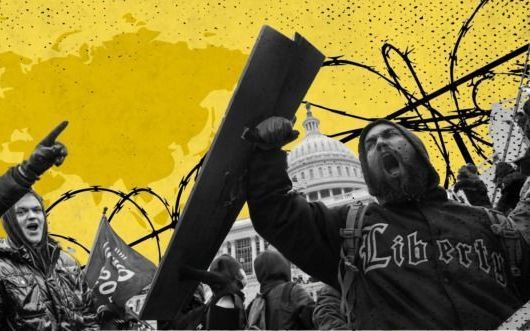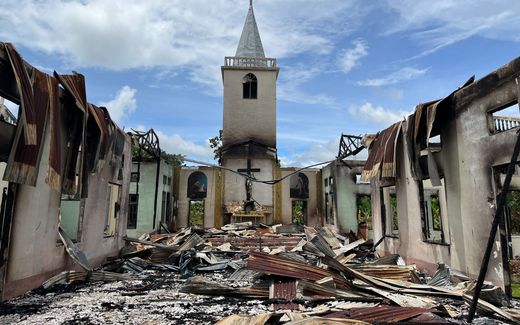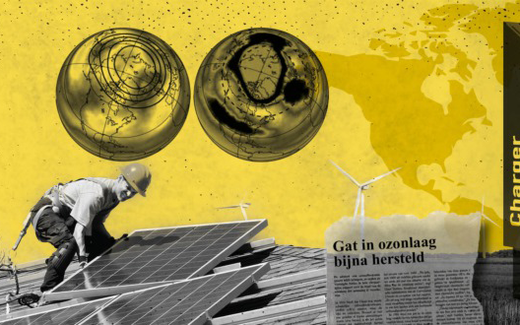Radical right as a refuge in times of doubt
03-02-2023
Opinion
Jacob Hoekman, RD

Photo Corné van der Horst
Opinion
A decade ago, if you started taking stock of which politicians were threatened and by whom, it quickly became clear where the greatest danger came from: from Islamic extremists.
The Dutch leader of the populist Freedom Party (PVV), Geert Wilders, was living proof of it - and he still is, as jihadism remains the most significant terrorist threat to the Netherlands. The Dutch General Intelligence and Security Service (AIVD) keeps a close eye on that, and last assessed the threat in November 2022.
Deadly attacks
Yet the question is how long jihadism will remain in the lead. Terrorist threats increasingly lurk in another corner, that of right-wing extremism. And it is not just threats: there have been deadly attacks by right-wing extremists here and there in Europe and the United States in recent months.
At the same time, it is crucial to pay close attention to what right-wing extremism means. The AIVD rightly opts for a dichotomy. There is 'pure' right-wing extremism, where neo-Nazis, for example, feel at home and where repopulation theories are used to legitimise violence.
The most dangerous people on this spectrum are the so-called accelerationists. It refers to people who want to accelerate the start of a race war. The goal of such a war is to replace democracy with a "white ethnostate". One of the most notorious followers of that doctrine is Brenton Tarrant, who shot believers in mosques in New Zealand in 2019, killing at least 50 people. He has a group of followers internationally who are also willing to use violence.
Anti-government extremists
Apart from this pure right-wing extremism, there is a group that is much harder to define. It exists of anti-government extremists. They may include right-wing extremists, but not necessarily. These are mainly people who believe that a monster alliance of a malevolent elite runs the world. Corona measures, nitrogen rules, the climate approach: all these significant issues are the breeding ground for the supposed oppression from the government. Dissatisfaction with this does not automatically lead to violence. Still, at the very least, it strengthens the we versus them thinking in society.
Now you can worry about impending violence, but as with jihadists, a good approach starts with understanding. And that is something that is usually not given much attention. Why does right-wing extremism find such fertile ground these days?
Landscape
One of the best recent studies on the subject is by the Dutch Nikki Sterkenburg, an ex-journalist who now works for the Dutch Ministry of Justice and Security. She did her PhD in 2021 on the new generation of the radical and far-right in the Netherlands. Although - even in those scant two years since the publication of her study, the extremist landscape has already changed. The diffuse group summarised here was nowhere near as visible then.
Nonetheless, her study offers many insights, especially since she had extensive discussions with right-wing extremists. Among them were people who feel at home with the populist party Forum for Democracy. Still, she also met "quite a few" Reformed people there, she said earlier. The traditional male-female role pattern, having many children, and more money for defence forces are shared beliefs.
Deport races
Again and again, the researcher points out that these people often look neat - you wouldn't say they can turn violent. So that is not where it starts; Instead, it begins with words, according to her, with the careful introduction of ideas that initially denounce a real problem but gradually degenerate into plans to deport races or kill representatives of the elite.
She compares her interviews with right-wing extremists with prominent theories on radicalisation. One such theory is the "social identity theory". This involves seeing the other as the enemy. Those who identify themselves as Dutch and Christian may - whether under group pressure or not - take the step of actively defending themselves with other Dutch people and Christians against anything that threatens that identity - and according to some research, Christians are more sensitive to this than other groups, which could partly explain the contribution of Reformed people in radical discourse.
Refuge
Other right-wing extremists, on the contrary, come from the fringes of society. They feel they do not belong anywhere and are very dissatisfied with their own lives. Joining a right-wing extremist group gives them control of their lives again. The extreme right thus becomes a refuge, a beacon of stark certainty in an uncertain time.
Experts point out that an effective approach should start as early as possible. The starting point lies in recognising signs, beginning the conversation, and offering a counter-narrative. Especially for churches with a close-knit social structure, this should not be so difficult. The problem, especially in the United States, is that churches are sometimes part of the problem. Once Christian conservatism in churches gradually becomes more important than the Gospel, things can just go wrong.
Evangelicals
That is observed by Elizabeth Neumann, for example, who is herself a convinced Christian and worked for the Department of Homeland Security under President Trump. She has herself seen up close how far-right ideas can take root among ordinary evangelicals. In fact, she sees only one remedy: "To put this right, you will really have to go back to Scripture."
Sometimes the best solution lies in plain sight.
This article was translated by CNE.news and published by the Dutch daily Reformatorisch Dagblad on February 1, 2023
Related Articles






